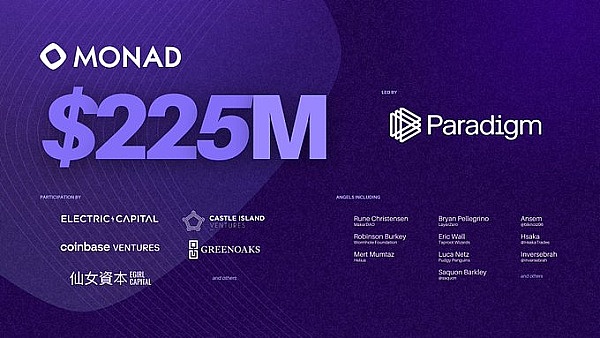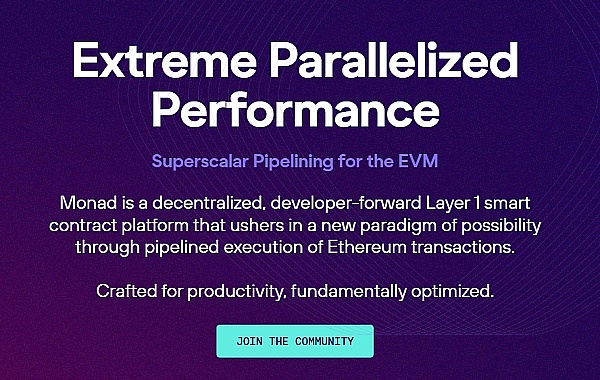Author: Vanguard_
Layer 1 blockchain Monad Labs recently announced that it has completed a $225 million financing round, led by Paradigm, with participation from Electric Capital, SevenX Ventures, IOSG Ventures and Greenoaks. This round of financing is the largest in the cryptocurrency field since 2024. Keone Hon, founder of Monad Labs, said that Monad's goal is to rebuild the Ethereum blockchain, retain the function of executing smart contracts, while achieving faster transaction speeds, higher processing capacity and lower costs, and fully support EVM.

The project is aimed at existing high-performance blockchains such as Solana and Sui. Its strong financial support and technological innovation demonstrate its potential to become a top blockchain platform. Soon after, HTX Ventures also announced a strategic investment in Monad Labs, which will further promote the innovative development of the Web3 ecosystem.
The following content will introduce the details of the Monad Labs project, its technological innovations, and its potential impact on the existing blockchain ecosystem.
Beyond Limitations: EVM Security and Challenges, and Monad Labs' Road to Innovation
The Ethereum Virtual Machine (EVM) is an important innovation in blockchain technology. It is not only the computing engine of the Ethereum network, but also the core of implementing smart contracts and decentralized applications (dApps). As a quasi-Turing-complete system, EVM allows smart contracts to be executed seamlessly on the Ethereum blockchain, supporting the operation and development innovation of the entire network.
Core Functions and Architecture of EVM
EVM executes smart contracts through bytecode, which is the result of compiling high-level languages (such as Solidity). These bytecode instructions control all operations from arithmetic operations to data storage and retrieval. As a stack machine, the operation of EVM is based on the last-in-first-out principle, and each operation consumes a certain amount of "gas". This mechanism measures the computational complexity of each operation, ensures fair use of resources and prevents abuse of the network.
In Ethereum, transactions can be divided into two types: trigger message calls and contract creation. Contract creation transactions generate a new contract account on the blockchain, which contains the corresponding compiled smart contract bytecode. The execution of smart contracts involves multiple components of the EVM, including the stack, memory, and persistent storage, the latter of which saves the contract state on the blockchain.
Security Mechanism of EVM
To ensure the safe execution of smart contracts, EVM has designed a variety of protection measures. This includes isolating the execution environment to prevent reentry attacks, setting gas costs and stack depth limits, etc. These security features are key to maintaining network trust and consistency.
The impact of EVM and its extension
The influence of EVM goes far beyond Ethereum itself, and many EVM-compatible chains have taken on the task of promoting this technology to a wider range of applications. These compatible chains not only maintain a high degree of compatibility with Ethereum applications, but also interact seamlessly with mainstream Ethereum applications such as MetaMask and Etherscan, greatly promoting its application in enterprise solutions, game finance (GameFi) and decentralized finance (DeFi).
However, despite the widespread deployment of EVM in the blockchain field, its processing speed and cost efficiency limitations have gradually emerged. This has prompted projects like Monad Labs to solve these bottlenecks through technological innovation, promoting the development of parallel processing technology and optimized consensus mechanisms, which are not only compatible with EVM, but also greatly improve transaction speed and system efficiency, showing the development direction of the next generation of blockchain technology. Through such innovations, projects such as Monad aim to improve the overall performance of blockchain while solving the scalability problems of existing technologies to support a wider range of application scenarios and more complex business needs.
Monad Labs: An Innovative Ethereum Compatible Layer-1 Blockchain Platform
A New Hope for Breaking Through the Performance Limitations of the Ethereum Virtual Machine
Monad Labs was founded in 2022 by former Jump Crypto senior engineers Keone Hon and James Hunsaker, with the goal of solving the performance limitations of the Ethereum Virtual Machine (EVM) through technological innovation. Shortly after the project was launched, in February 2023, Monad Labs completed a $19 million seed round of financing. By March 2024, Paradigm had led more than $200 million in funding, creating the largest round of financing in the cryptocurrency field that year.

Technology Revolution: Superscalar Pipeline and Parallel Execution
Monad is a high-performance Ethereum-compatible L1 blockchain that significantly improves the system's throughput and transaction speed by introducing innovative technologies. Specifically, Monad is optimized in the following four main areas:
MonadBFT - an optimized consensus algorithm that uses a pipelined HotStuff BFT model to enhance consensus efficiency.
Delayed Execution - By separating the consensus and execution processes, latency is reduced and execution speed is increased.
Parallel execution - Optimizes transaction processing using optimistic parallel algorithms, supporting processing speeds of over 10,000 TPS.
MonadDB - A high-performance state backend database that optimizes data storage and access speed.
These technical innovations not only improve performance, but also ensure compatibility with existing EVM applications, which can be migrated to Monad without modification.
Marketing strategy: effective community interaction
Monad Labs is not only innovative in technology, but also has a highly targeted and creative marketing strategy. The team frequently interacts with the community through Twitter and Discord and has a large number of fans. They regularly hold meme competitions, using the creativity of the community to add vitality to marketing activities, effectively increasing user participation and project visibility.
The next generation blockchain platform that is highly portable and exceeds performance
Monad provides users and developers with the best of both worlds: high portability and excellent performance.
Portability: Monad fully supports EVM bytecode, which means that applications developed for Ethereum can be migrated to Monad without changing the code. The full Ethereum RPC API compatibility also allows common tools such as MetaMask and Etherscan to be used directly.
Performance: Through its technological innovations, Monad achieves a throughput of 10,000 transactions per second and a block time of less than 1 second, which is much better than most blockchain platforms on the market today.
Monad: The next generation blockchain platform that will subvert Ethereum?
Monad's optimization not only increases transaction speed, but also reduces operating costs, making it an ideal platform for developing decentralized applications (DApps). Through these technological innovations, Monad is expected to become the standard of Ethereum in the next few years, providing users and developers with more efficient and economical blockchain solutions.
Every technological advancement of Monad is a challenge and advancement to existing blockchain technology, indicating that the future of decentralized applications will be more extensive and popular. Through its strong technical foundation and active market strategy, Monad Labs is gradually realizing its vision of becoming a high-performance blockchain platform.
Monad Labs: Unlocking Ethereum Performance Bottlenecks and Opening a New Era of Blockchain
With the continuous evolution of blockchain technology and the rapid expansion of the crypto market, the performance limitations of the Ethereum Virtual Machine (EVM) have become a challenge that needs to be solved urgently, especially when dealing with large-scale transactions and application scenarios. In this context, Monad Labs has significantly improved the processing capacity of blockchain with its revolutionary parallel execution and superscalar pipeline technology, increasing the throughput to 10,000 transactions per second.
Monad has not only achieved major breakthroughs in technology, but its full compatibility with Ethereum also ensures that existing Ethereum applications can be seamlessly migrated, greatly reducing the migration costs of developers and the usage threshold of users. In addition, its innovative MonadBFT consensus mechanism and MonadDB state database provide strong guarantees for the security and stability of blockchain.
As an important supplement to the Ethereum ecosystem, the emergence of Monad not only provides developers with more choices, but also brings users a faster and lower-cost blockchain interaction experience. In the future, with the addition of more applications and users, Monad is expected to occupy a place in the high performance and scalability competition of blockchain.
Ultimately, Monad Labs' continued innovation and development, coupled with its active community engagement and market strategy, indicate that it will play a key role in promoting new progress in blockchain technology standards. With the launch of its public testnet and the implementation of more optimizations, Monad will not only enhance the competitiveness of the Ethereum ecosystem, but also bring broader benefits to developers and users around the world.
 JinseFinance
JinseFinance
 JinseFinance
JinseFinance Dante
Dante JinseFinance
JinseFinance JinseFinance
JinseFinance JinseFinance
JinseFinance JinseFinance
JinseFinance JinseFinance
JinseFinance JinseFinance
JinseFinance Beincrypto
Beincrypto Cointelegraph
Cointelegraph